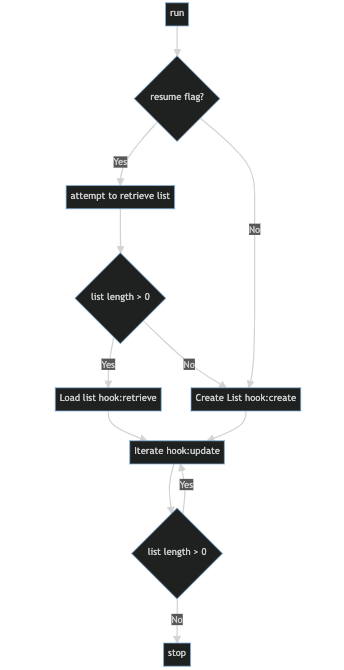Tiny Example: managing state in oclif

This is the first of what I hope to be many ‘Tiny Example’ posts where I describe the implementation details of a discreet piece of functionality. The Tiny Examples grew out of a desire to to better understand specific coding concepts and patterns. Existing examples can be found on GitHub at mvogelgesang/tiny-examples.
In many instances, CLI operations return results or execute a task rather quickly. However, ther are times when operations may have to iterate through a list of files, sync data, or make a series of API calls. In these instances, it can be helpful to pause operations and later resume the job. This Tiny Example prototypes start, stop, and resume functionality using an oclif-based CLI.
Getting started
This Tiny Example is built using oclif which is an open source CLI framework maintained by Salesforce. To get up and running quickly, we leverage the starter code produced by npx oclif generate myexamplecli which creates a simple CLI with a hello command. Later on, we will add a new command, hello everyone which iterates over a list of names printing hello {name} to the console. Between each print to the console, the CLI pauses for one second.
Considerations
- Needs to save state in a place that will persist between runs
- After each iteration, state should update
- If previous state does not exist, should run without issue
- Should have the ability to restart the operation entirely and ignore the previously saved state
About oclif Hooks
oclif offers a hook framework allowing the injection of code at various stages of the command lifecycle. Four lifecycle events are included (source oclif Hooks):
init- runs when the CLI is initialized before a command is found to runprerun- runs afterinitand after the command is found, but just before running the command itselfpostrun- runs after the command only if the command finishes with no errorcommand_not_found- runs if a command is not found before the error is displayed
These are great for times when you want to run an action with every command in your CLI- think checking for updates, ensuring config is set, etc. However, this example seeks to apply hooks only on a specific command and will leverage custom hooks. Hooks take any string value as their name. Three distinct hooks are required: create, retrieve, and update. Prefixing each file with “state-manager” ensured the hooks were easy to identify and reference.
Putting it together
At a high level, the following steps will need to be coded for this to work.

The new hello everyone command and three hooks can be scaffolded via:
oclif generate command hello:everyoneoclif generate hook state-manager:createoclif generate hook state-manager:retrieveoclif generate hook state-manager:updateAfter producing the initial working version, I removed the hard-coded reference to the file name and passed it into each hook as a variable. Doing so enables this hook structure to be used elsewhere in the application.
Hook create
In order to save a local copy of the list between runs, we make use of the cache directory which is automatically configured with oclif. Doing so keeps it out of the way of our repository files and enables users to customize it if necessary.
Since this is a simple list of names, we can save the file as JSON.
Hook retrieve
The retrieve hook returns an array whether there is a list of names or not. The underlying function is placed in helper.ts since I also use it in the update hook.
Hook update
The update hook reads in the file, extracts the array, drops the first element from the array, and writes the resulting array back to disk.
Running it
yarn run prepackbin/run hello everyoneNames will print each second. Break the loop with ctrl+c. Resume the operation by adding the -r flag.
bin/run hello everyone -rFull code
A working example of this functionality can be found on GitHub.